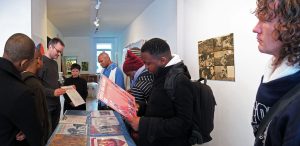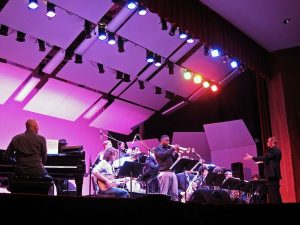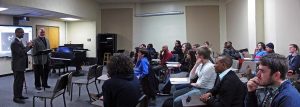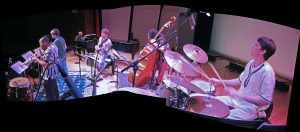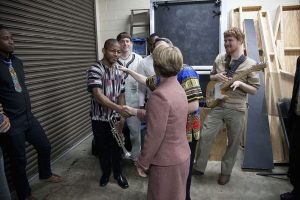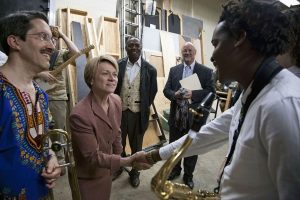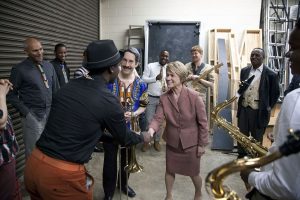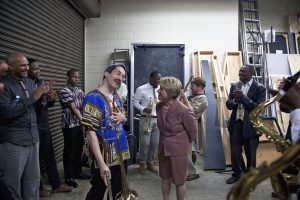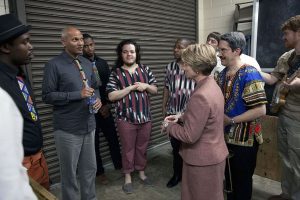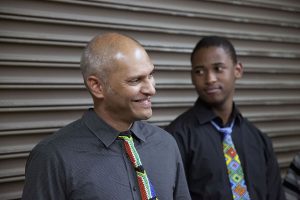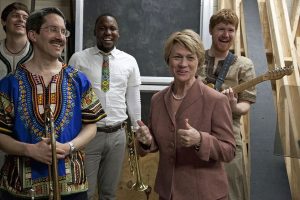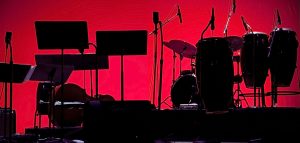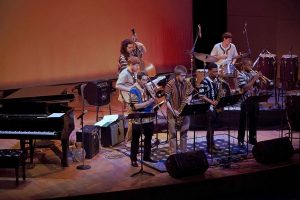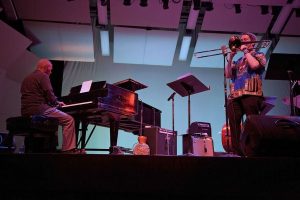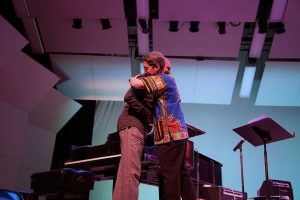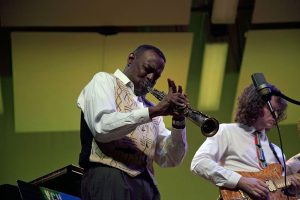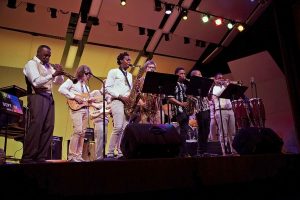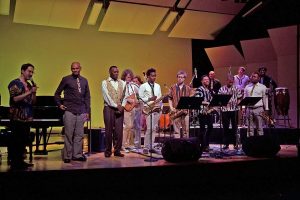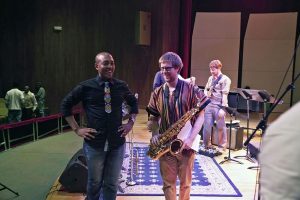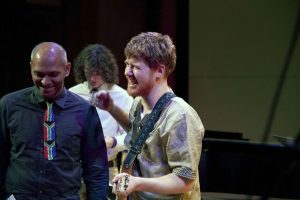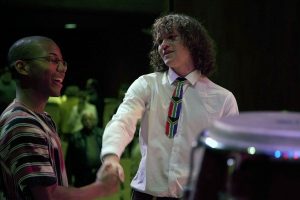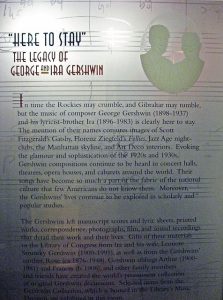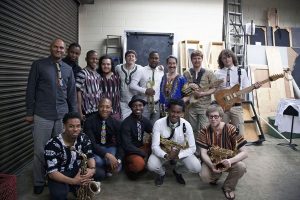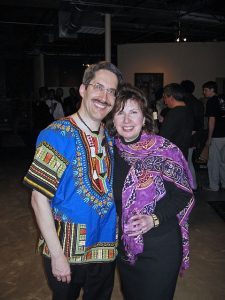Trip 4: UKZN to VCU March 2013
Trip 4: UKZN to VCU March 2013
(Written in Prof. Garcia’s voice…)
As you may already know, VCU Jazz received an “International Partnerships Major Initiatives Award” (IPMI) to bring American and African citizens together in musical and personal understanding. VCUarts generously matched the grant. Titled “VCU and the University of KwaZulu-Natal: A Jazz Bridge to Greater Understanding,” this grant project brought together students and faculty of the Jazz Studies Programs of Virginia Commonwealth University and the University of KwaZulu-Natal in Durban, South Africa over the course of the VCU academic year.
As in Fall 2012, UKZN visited Richmond in the last week of March 2013, this time to close out the exchanges of the year. It was a delight to be able to host our friends here again! While Mary and I did not travel–thus the tale less exotic from our own view–I really should share some images and tales from this final trip of the four exchanges.
Throughout the year’s planning, Neil had asked me about Richmond’s weather in late March. “Wonderful, spring-like…mild days, cool evenings,” I always replied.
And they arrived on Sunday, March 24 to…
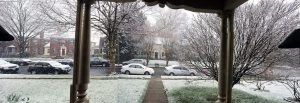
SNOW!!!
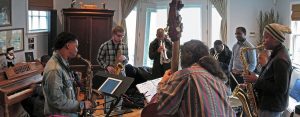 Fortunately I had warned them in the preceding days so that they brought some appropriate weather-wear as they started their visit at our house for a jam session with the VCU team.
Fortunately I had warned them in the preceding days so that they brought some appropriate weather-wear as they started their visit at our house for a jam session with the VCU team.
Monday began with a visit to the art studio of VCU Prof. Siemon Allen. He specializes in collecting and studying South African music album covers as social and political commentary: specifically, he examines how the liner notes differ depending on whether 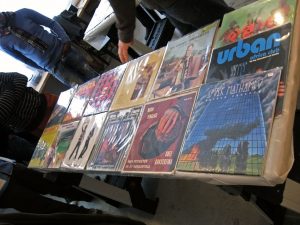 released in South Africa, Europe, the U.K., U.S., etc., as different countries allowed and did not allow some statements to be published. Assisting the presentation was VCU Prof. Kendall Buster, who also specializes in art of a South African focus.
released in South Africa, Europe, the U.K., U.S., etc., as different countries allowed and did not allow some statements to be published. Assisting the presentation was VCU Prof. Kendall Buster, who also specializes in art of a South African focus.
One of many special albums in particular caught our eye:
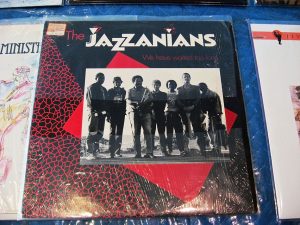 This album had been released in the late 1980s by UKZN’s former incarnation, the University of Natal (Durban), which is the form by which I had first been introduced to that jazz program in the 1990s as editor of the International Association of Jazz Educators’ Journal. A few years later I twice had hosted UND alumnus Zim Ngqawana, a brilliant saxophonist, at Northwestern University. And when I’d first visited South Africa about ten years ago for a jazz conference, I got the chance to make music with pianist Melvin Peters and drummer Lulu Gontsana. To see them on this cover–especially now that Zim and Lulu have since passed at young ages–was a special moment. And others pictured, including trumpeter Johnny Mekoa, have also gone on to important careers in jazz.
This album had been released in the late 1980s by UKZN’s former incarnation, the University of Natal (Durban), which is the form by which I had first been introduced to that jazz program in the 1990s as editor of the International Association of Jazz Educators’ Journal. A few years later I twice had hosted UND alumnus Zim Ngqawana, a brilliant saxophonist, at Northwestern University. And when I’d first visited South Africa about ten years ago for a jazz conference, I got the chance to make music with pianist Melvin Peters and drummer Lulu Gontsana. To see them on this cover–especially now that Zim and Lulu have since passed at young ages–was a special moment. And others pictured, including trumpeter Johnny Mekoa, have also gone on to important careers in jazz.
Siemon’s accomplishments received major recognition just a few weeks after our visit to his studio: he received a Guggenheim Fellowship!
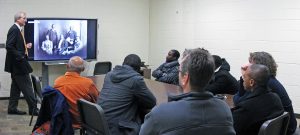 Various rehearsals spanned the Monday, Tuesday, and Wednesday, along with classes, some lessons, jam sessions, and visits to area clubs to hear performances and sit in. Tuesday brought a visit by the Virginia Museum for the Arts’ African Art curator, Dr. Richard Woodward, who provided us with an astonishing introduction to the historical links between Zulu Africans and our own Commonwealth of Virginia.
Various rehearsals spanned the Monday, Tuesday, and Wednesday, along with classes, some lessons, jam sessions, and visits to area clubs to hear performances and sit in. Tuesday brought a visit by the Virginia Museum for the Arts’ African Art curator, Dr. Richard Woodward, who provided us with an astonishing introduction to the historical links between Zulu Africans and our own Commonwealth of Virginia.
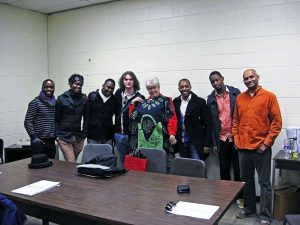 After that session, the UKZN team presented VCU Music’s Administrative Director, Linda Johnston, with an African dress (which she later wore to our concert). Linda not only makes all the travel and financial logistics happen, but she also went out of her way to provide the students with refreshments at various points of their travels.
After that session, the UKZN team presented VCU Music’s Administrative Director, Linda Johnston, with an African dress (which she later wore to our concert). Linda not only makes all the travel and financial logistics happen, but she also went out of her way to provide the students with refreshments at various points of their travels.
With Neil’s help I had obtained some big band charts by a South African musician I’d met a decade ago, and so Neil and his students sat in to perform them with the VCU Jazz Orchestra II on its Tuesday evening concert.
Wednesday included a visit by University of Virginia historian Dr. John Edwin Mason, who presented VCU’s Jazz History class (taught by our own Dr. Darryl Harper) and our guests with insights as to the evolving cultural relationship between the United States and South Africa.
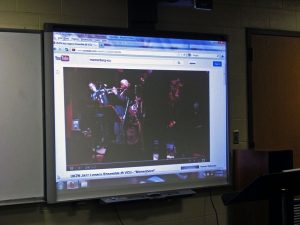 He led off with a video clip of the UKZN Jazz Legacy Ensemble performing at The Camel in Richmond last September, as recorded by Siemon Allen and Kendall Buster.
He led off with a video clip of the UKZN Jazz Legacy Ensemble performing at The Camel in Richmond last September, as recorded by Siemon Allen and Kendall Buster.
Later that afternoon came one of the cornerstones of the visit: a dialogue with saxophonist Plunky Branch regarding jazz and civil rights. It was an earnest and moving exchange.
And then the students of both schools rehearsed with Plunky on Victor Haskins’ new arrangement of Plunky’s composition “Nia.”
On Thursday my daughter Kate and I drove the UKZN students out to Short Pump Mall, where they had visited in September, so as to get some shopping in. Once back on campus, rehearsal got underway for the final concert of the year-long project!
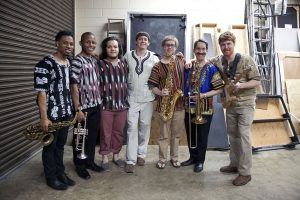
The VCU team was decked out in its African apparel (much from the Victoria Street Market field trip in Durban a few weeks prior).
The UKZN team was equally resplendent in beaded ties, created in the Ndebele tradition.
VCU’s Provost, Dr. Beverly Warren, was kind to come backstage prior to the start of the concert to meet all the musicians, as did the VCU Global Education Office’s Dr. McKenna Brown (who oversees the GEO’s sponsorship of our grant activities).
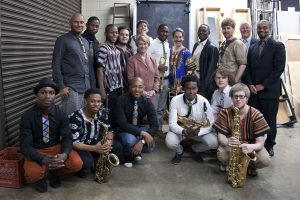
And I received a round of applause for correctly (well, I’m sure mostly correctly) pronouncing the names of each of our guests!
Everyone was in a good mood, and it was time to get rolling!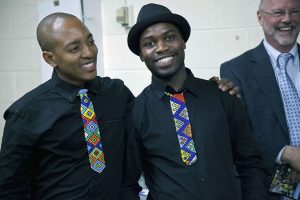
The stage was bathed in red as the musicians approached, to the recorded sounds of a composition I’d written for African mbiras some ten years previous.
The Provost offered the audience welcoming remarks, and the concert was underway!
As African national colors bathed the stage, Plunky Branch tore into the closer, “Nia,” which will serve as the opener of our CD when released this Fall.
And the crowd showed its appreciation.
The performers’ satisfaction showed as they left the stage.
And then, after meeting the audience in the lobby, it was off to a party, graciously co-hosted by Darryl Harper and Sonya Clark!
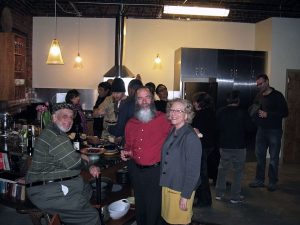
Mary caught up with each of the UKZN students.
At one celebratory point, the Durban students broke out into a spontaneous, harmonized vocal performance of the South African national anthem. I doubt many American students could suddenly sing our National Anthem in terrific harmony!
Sonya Clark asked everyone to sign her concert program.
Each member of the UKZN team was kind to present his beaded tie to his counterpart on the VCU team. What a colorful gift!
I had titled my commissioned composition “Reunion: Brothers from Another Mother,” reflecting the joy and friendship immediately apparent among the VCU and UKZN musicians upon their very first meeting in Durban in July 2012–a delight that remains to this day. So now this evening Sonya took pictures of each of the “brothers” that had been separated at birth.

And I captured her and my lovely wife as well–sisters from another mother?
Turnabout is fair play…
It had been a grand night and a grand conclusion to our performances over the previous eight months. But it was not the conclusion of the trip, not at all! And I did do some traveling the next day.
The terrific visit by the UKZN team at VCU throughout that week was capped with a day-long field trip that Friday to Washington, D.C., where they met with Dr. John Edward Hasse (American Music Curator, National Museum of American History); Ken Kimery, Executive Producer of the Jazz Masterworks Orchestra; Wayne S. Brown (Director of Music and Opera for The National Endowment for the Arts); Michael Orlove, NEA Director of Presenting and Artist Communities; Katja von Schuttenbach, NEA Jazz Program Officer; Pennie Ojeda, NEA Director of International Activities; Ralph Remington, NEA Director of Theater and Musical Theater; and Larry Appelbaum (Senior Music Reference Librarian and Jazz Specialist, Library of Congress), receiving the opportunity to see many historical jazz treasures and dialogue with many of the federal representatives whose constant work preserves and moves forward the legacy of jazz in the U.S. and around the world. We are grateful to VCUarts’ Sarah Cunningham for lining up these daytime conferences.
 The day began with the UKZN team’s checking out of its Richmond hotel at 8a for the van drive to DC with Darryl Harper, Sonya Clark, VCU students John Bradberry and Colleen Trempe (who had hosted the UKZN students at times during their September and March visits), and me. Sarah Cunningham, already in DC, met us there.
The day began with the UKZN team’s checking out of its Richmond hotel at 8a for the van drive to DC with Darryl Harper, Sonya Clark, VCU students John Bradberry and Colleen Trempe (who had hosted the UKZN students at times during their September and March visits), and me. Sarah Cunningham, already in DC, met us there.
It was an early start for students–and teachers!–after a concert night and grand party. But we were blessed with the best weather of the week for the day in which we’d be traveling on our feet the most.

Upon entering the National Museum of American History, curator John Hasse showed us the view of Washington, D.C. from the window before we examined historical artifacts of Ray Charles (chess set, glasses), Duke Ellington (medals), Ella Fitzgerald (Grammy), Michael Jackson (glove), Buddy Rich (case), and more.
Ken Kimery came in to tell us more about the items.

After our morning at The Smithsonian, John Hasse generously gave a complimentary copy of The Smithsonian Collection of Classic Jazz to Neil Gonsalves for UKZN’s Centre for Jazz and Popular Music.
From there we migrated to The National Endowment for the Arts.

It was a terrific exchange of thoughts, with wonderful support from our hosts, who also most graciously provided us lunch.
On to The Library of Congress! For this commute, in the interest of time, we took cabs. And what a patriotic view!
At the LOC Larry Appelbaum served as our historical guide. It was Appelbaum who in 2005 discovered the 1957 Thelonious Monk/John Coltrane Carnegie Hall tapes in the Library and re-mastered them for release.

One of Larry’s colleagues stopped by to say hello and offer some perspectives. It turned out that for a while he had taught music appreciation at UKZN; so he and Neil knew each other. Small world!
It’s not often that you can be in the same room as historic jazz manuscripts, but most are available to visitors at the LOC on a regular basis. Here UKZN’s Sebastian Goldswain gets an up-close look at Gerry Mulligan’s writing for “Venus de Milo,” as recorded by Miles Davis for the “Birth of the Cool” album of 1957.
A number of items are available for review online, such as the William Gottlieb photographic collection, hi- and lo-res.
This book is an unpublished manuscript by pianist Teddy Wilson on “Modern Piano Playing”:
He showed us Ferde Grofe’s original manuscript orchestrating George Gershwin’s “Rhapsody in Blue” for Paul Whiteman’s Orchestra…
…George Russell’s 1953 manuscript deposit for what would become his “Lydian Chromatic Concept”…
…and Charles Mingus’ manuscript for the movement “Freedom” presented within the 1989 posthumous performance of his unfinished “Epitaph” suite.
As we traveled through the hallways of the LOC, Neil paused to reflect next to the baritone sax of Gerry Mulligan.
Appelbaum invited us to enjoy a view of the renovated lobby area…
…on the way to the Gershwin exhibit, which I’d had the pleasure of visiting the last time I’d been at the LOC.
Gershwin’s piano and desk…
…and manuscript for “There’s a Boat Dat’s Leavin’ Soon for New York” from “Porgy and Bess.”
Appelbaum led us out the main door for this picturesque shot on the steps of the LOC with the Capitol Building in the background.
Now it was time for dinner, at a site I’d picked as near the evening’s activities to come. I’d picked “Busboys and Poets” for its convenience, large seating capacity, and wide-ranging menu. I’d known that its title was related to the African American poet Langston Hughes, who’d worked as a busboy in DC prior to gaining recognition as a poet. The menu tells a bit more of the story at the lower right of this page:
What I had not realized in my planning is that I’d inadvertently chosen the IDEAL final formal dining locale for our yearlong joint project, as the restaurant’s theme is dedicated to civil rights and social justice. The wall near us was a montage of iconic images from the freedom movements of many countries, including the U.S. and South Africa:
 And so it was that we gathered in international friendship to share good food, good times, and reflections about our wonderful day thus far.
And so it was that we gathered in international friendship to share good food, good times, and reflections about our wonderful day thus far.
One of the UKZN students commented to me that America, and D.C. in particular, was an amazing place, given the focus on jazz by the U.S. government that we’d experienced in recent hours. I had to share two perspectives: first, that in my 35 or so years as a jazz musician and 25 or so as a jazz educator, I’ve been extraordinarily blessed with incredible experiences–but that I’d certainly not had a day quite like this one, with its focused attention on us from the core of U.S. administrators most entrusted with preserving and advancing jazz and jazz education in the nation. My second perspective: most of those administrators and most jazz musicians in the U.S. would say that as wonderful as those constant efforts are, it’s not enough; many of us would like to see jazz further recognized and supported by governmental efforts. But it’s breathtaking to see what’s already being done.

After our terrific dinner, the night turned from archive to live, as the students then attended D.C. jazz clubs. First up was a set at Twins Jazz by The Sarah Hughes–Brad Linde Quartet, at which we had kindly been presented front-table seats.
 To close the night, I’d arranged for us to hear the second set at Bohemian Caverns by drummer Kendrick Scott with John Ellis (woodwinds), Mike Moreno (guitar), Taylor Eigsti (piano), and Joe Sanders (bass). It’s a unique venue, constructed in cave-like manner.
To close the night, I’d arranged for us to hear the second set at Bohemian Caverns by drummer Kendrick Scott with John Ellis (woodwinds), Mike Moreno (guitar), Taylor Eigsti (piano), and Joe Sanders (bass). It’s a unique venue, constructed in cave-like manner.

After the set I invited Scott to say hi to our visitors…
…and to share a moment with one of his admirers, UKZN drummer Sphelelo Mazibuko:
Tired but happy, our entourage emerged around midnight to await our van ride…
…which took us to our UKZN guests’ hotel, near Dulles Airport, where they would fly out of the U.S. the following afternoon. So it was at about 1a on Saturday morning when we had to say farewell to our good friends from Durban–after which the VCU contingent rode the van home to Richmond, arriving about 3:30a as planned. Mission accomplished for a great day and night of DC jazz explorations!
The bond between our students, faculty, and staff was evident throughout. During the van-ride to D.C. that Friday morning, one of the UKZN students realized that he was missing his wallet and guessed that it was still at the hotel he’d checked out of, or maybe in the vehicle of one of our students with whom he’d commuted post-concert the night before. An electronic “bucket brigade” ensued. Once in D.C., one of our accompanying VCU students confirmed the wallet’s whereabouts with a student back in Richmond. The two VCU students on our tour, Colleen and John, then contacted a swath of VCU students back home to assess if anyone might be headed to D.C. as well so as to convey the wallet. Within an hour or two they’d arranged for one student in Richmond to bring the wallet from the hotel to the VCU Music Office at the close of the business day. There Linda Johnston, again above and beyond the call of duty, stayed after hours a bit until one of our alumni/faculty could pick it up from her. He then passed the wallet to another VCU alum at his gig late that night. This alum then brought the wallet along her existing plans to go the D.C. area yet later that night. And so on the UKZN team’s final morning in the U.S., he received his wallet back. Just another day of international friendship.
Said Neil Gonsalves, Director of the UKZN Centre for Jazz and Popular Music, “The UKZN Jazz Legacy ensemble is immensely proud to represent the long tradition of jazz and jazz education in South Africa. UKZN was the first tertiary institution on the African continent to offer a formal jazz program way back in 1983 with the arrival of Darius Brubeck in Durban, South Africa. The program took root in fertile soil where African-American culture and jazz in particular had been a constant influence and aspirational force since the 1920s and had provided a beacon of light and freedom in the darkest days of apartheid.
“South African jazz has its own swagger though, which is rooted in the many kinds of urban music that are part and parcel of a migrant culture. Through the gift of this exchange, we can proudly say that local South African music forms and styles such as mbaqanga, maskanda, and marabi have taken their place alongside the blues, standard tunes, and bebop as platforms for musical dialogue between our respective ensembles. At the concert we celebrated this dialogue which we recognize from our exchange experience as being rooted, at least partially, in our common Southern heritage of migration from serfdom to global citizenry; and we acknowledge the effectiveness of this jazz bridge that we’ve built towards developing greater understanding.
“We humbly acknowledge and thank our VCU friends for their generosity, both financially and in spirit-and special thanks to Prof. Antonio García for his vision, incredible work ethic, and constant encouragement and support. Special thanks also to Victor, Trey, Brendan, Chris, Justin, and C.J.: our brothers from another mother!”
I had also offered a long printed list of thank-you’s in the March 28 concert program, particularly to “the UKZN Jazz Legacy Ensemble–Linda, Sakhile, Sebastian, Lungelo, Ildo, and Sphelelo–we thank you for your artistry, friendship, and welcoming personalities: thank you for teaching us about your life, music, hopes, and culture. To Neil and Nareen Gonsalves, we have no words to adequately represent our love for and gratitude to you. I could not have imagined a more ideal intercontinental colleague in our mutual pursuit of this project than Neil Gonsalves, whose quiet and resolute manner, personal character, sense of humor, and stunning musicianship inspire all around him. To have met Nareen is to know the generous, kind, and brilliant person who inspired his clarity of mind to ensure their lives would remain intertwined; and we at VCU have also benefited from that decision! We have all made new lifelong friends, and we have such respect and appreciation for what you both do and how you do it. May we reunite soon.”

photo credit: Raina Fields
This has been a massive project that has brought musical, cultural, and personal growth to residents of both communities. Because of the great success of VCU Jazz’s partnership with the Centre for Jazz and Popular Music at the University of KwaZulu-Natal, our project was chosen as the 2013 recipient of the VCU Community Engagement Award for Research, an award saluting VCU’s efforts to engage its community locally, nationally, and internationally through research. The presentation was made at a celebratory event May 9 and was presented by Dr. Christina Lindholm, VCUarts Associate Dean and the Chair of the Awards Committee. The project had been nominated by Linda Johnston, Administrative Director of the VCU Department of Music. Richard Woodward (Curator of African Art, Virginia Museum of Fine Arts) attended, representing the many community partners involved in this undertaking, as did Dr. R. McKenna Brown (Executive Director, VCU’s Global Education Office) and Prof. Joe Seipel (Dean, VCUarts), representing the two entities that co-funded the $100,000 project, along with Music Chair Dr. Darryl Harper, Jazz Studies Saxophone Major Trey Sorrells, and yours truly.
As Dr. Cathy Howard (Vice Provost, Division of Community Engagement) emphasized post-ceremony, the research component of the arts is sometimes overlooked when compared to the sciences. So this award represents a good flag-waving for the research component that goes into virtually every arts creation.
It has been a delight to bring Richmond and Durban more closely together! Though the current year’s partnership calendar has ended, we have much to look forward to. First, Fall 2013 will mark the release of our shared VCU/UKZN CD, “Leap of Faith,” containing music recorded on both continents, including with guests Madala Kunene and Plunky Branch. Second, journal-article creations are ahead, with one publication already slated for Fall 2013. Finally, we unofficially expect that some level of funding will allow some level of this exchange to occur again during the coming academic year. We look forward to what the future holds! Certainly all involved at both schools have already established solid friendships and the interest in staying connected, musically and personally. Stay tuned to the VCU Jazz E-Newsletter for developments on our collaboration.
The following are reflections from the 12 core students after this fourth trip.
* * *
Sphelelo Mazibuko
I truly feel honored to have been part of this exchange program. Meeting great friends, musicians, visual artists, government officials, and other great personalities showed me that it’s not impossible to make a relationship with people of different cultures work. I realized that it takes just one thing to get us speaking on the same ground, and for us it was art. Music has shown to be the most powerful tool in this exchange.
And again the reception we received on our second trip to Richmond was exceptionally amazing. I have never felt so much love from people outside of our culture boundaries appreciating our culture and music. Meeting Profs. Siemon Allen and Kendall Buster was wonderful, seeing how the world of arts is linked together: our South African music influencing visual art, and for me the visual art influencing my vision of music. Pictures that tell a story are as melody notes placed together to make up a beautiful picture of a song.
I’m glad there was more time this trip to check out the scene of Richmond. For some reason I felt like I knew Richmond now. It felt like my hometown of Newcastle, not only because it snowed but also because the town is like Newcastle in that everything is close together. So it was a feeling of being at home because our fellow friends from VCU made us feel free. I so grateful for the love that C.J., Trey, Victor, Brendan, Chris, and Justin have shown us. They are great musicians and great friends who know how to have great fun.
Because we had more time with the music and a much clearer idea of the sound we were dealing with, I believe the second (VCU) concert of our UKZN pieces was a great one. I am really grateful to Prof. Tony García and Victor Haskins for the beautiful music written for us to play. It was a wonderful show that night: everything was according to plan and without stress or depression. After the concert we felt sad because we knew we had to leave the following day. But the evening at Profs. Darryl Harper and Sonya Clark’s place, an amazing apartment, offered great food and great company. We extended the evening to Brendan’s place and had some good old fun with friends from VCU.
Washington was the climax of the trip: the most amazing day ever. Seeing The Library of Congress and other sites and most importantly seeing one of my favorite drummers and musicians in live show–Kendrick Scott–followed by a great day chilling by the pool with my fellows made the trip feel too short.
The whole exchange program was a success, and I will treasure it. We made history. And that’s all that matters: leaving a legacy with Brothers from Another Mother.
“Show the Love” always!!!
* * *
Sebastian Goldswain
Wow! I still can’t get over what an amazing experience this exchange programme has been! For both the VCU as well as UKZN teams this entire exchange programme has been an eye-opening and inspiring experience. Performing our indigenous types of jazz, as well as that of each other’s, on foreign continents for foreign audiences is an absolutely priceless experience; and we are extremely privileged, and of a very select few, to be able to have done so. Not only did I learn a lot about American music and music culture, but the programme also helped to give me a different perspective on my own country’s music, as well as the important role it has played historically throughout the world.
This fourth and final leg of the exchange proved to be my personal favourite. By this time, all the members of the respective teams were close friends; and no one was ever short on good company or time to tell a good story! In fact, more than a few stories have been made over the four legs, and we’ll all be able to tell them for the rest of our lives!
Performing the challenging compositions for live recording was a huge challenge for all of us; and I am proud of everyone for the way in which they were able to pull it off, in spite of the mountainous initial challenge. The day spent in D.C. was absolutely memorable, and I am hugely grateful to Dr. Sarah Cunningham for the opportunity to be able to be amongst and meet such honourable people while we were there.
I am extremely grateful to everyone who helped to make this a life-changing experience for me, and in particular to Prof. Tony García, Neil Gonsalves, and Linda Johnston–none of whom without this would have been able to happen!
* * *
Lungelo Ngcobo
What an amazing experience I have just lived with the exchange program joining UKZN and VCU. At first there was a lot of excitement mainly about going overseas, which was the first time for me last year; but this year I was really looking forward to playing.
The visit to Richmond last year was very interesting and eye-opening: I got to learn a lot about Virginia and the history of America. I personally got to make a whole lot of friends last year, mainly the guys who are part of the exchange and many students from VCU Music. It was really nice to make these new friends because it also enlarges possibilities for us to work again in America, with them or however else, because personally I want to be a world-class, touring piano player.
Whenever the VCU team visits UKZN, I really enjoy the energy they bring to our school. When we have jam sessions, we really enjoy playing and growing. I really appreciate the commissions: the music was new and interesting to me, and I had a lot to learn in terms of articulation and dynamics.
The last visit to Virginia was totally awesome with the gig, rehearsals, jam, classes, and the trip to D.C. I must really thank VCU for taking us to such high places in D.C. Seeing Kendrick Scott live was no joke for me because I am a huge fan of his music.
In conclusion I’m very thankful and grateful to be part of the exchange program. I learned a lot.
* * *
Ildo Nandja
This time around we felt more at home in Virginia, especially at VCU. Through our visits to galleries and different exhibits in both countries, we had found this connection between the two cultures and countries, which culminated in a beautiful concert. I also noticed that there was more engagement between the two teams as a result of our meeting last year, and the constant keeping in touch with each other in between our trips.
I personally would like this exchange program to continue, as it is a great opportunity not only to explore music but also other fields of interest. We have also noticed that lots of other windows have opened as a result of this exchange program and the performances that were presented by the two groups: another good reason to support for the exchange to continue.
* * *
Sakhile Simani
Let me take this opportunity and thank Prof. Tony García and his team for making this project so successful. Blessed the day I met these music students–UKZN and VCU–they are like a family to me. When I’m around them we had to talk about our dreams, ambitions, opportunities, hopes, and how to become a truly successful musician.
We have had such a warm welcome in Richmond, Virginia: I am being turned inside out by inspiration and hope. I experienced lots of things, met new friends, networked with other students, went to Siemon Allen’s library of South African music, talked about our South African musicians, and did a wonderful recording with beautiful music and musicians.
It was a great feeling hearing American folks talking about South African music. I never thought in my life I’d be called a guest student/musician and treated in a professional, disciplined manner in another country. One of the greatest moments in my life was to go to one of the largest libraries in the world: The Library of Congress. I felt so inspired when I looked in the eye and shook hands with one of the great delegates of The National Endowment for the Arts, The Smithsonian, and the Jazz Masterworks Orchestra in Washington, D.C. With both hands I give thanks to our Director, Prof. Neil Gonsalves, for choosing me to be part of this exchange programme. I so wish that the partnership will grow and blossom between the two universities.
* * *
Linda Sikhakhane
I would say it has been a great victory from our start on along to new adventures in jazz music between South Africa and the United States of America. At first I had pictured this as merely two weeks of musical exchange throughout six months, but I’ve just realized that this is a lifetime cultural exchange. I’ve learned so much in a very short period of time; and my life has changed through this successful exchange, musically and culturally.
The recording part of the exchange was very inspirational because we got to express our feelings through music written by our brothers from another continent who had taken their own time to visualize our sound as individuals and compose within our energy. It was challenging, I must say; but through faith and the help of Prof. García, Victor Haskins, and Prof. Gonsalves not only conducting the rehearsals but also giving us powerful lectures as to how we could merge this, all became possible; and the music was given life.
This occurred because reading and playing music weren’t the only purposes of the exchange. This involved a lot of spiritualism through sound and cultural experience. All the influences of our forefathers came to action; and the best part of this was sharing all our understandings through the music of this caliber, “JAZZ.”
The last day of the exchange was in Washington, D.C. It felt like we had been there for a month: one could learn so much in a day–a very inspirational day, I must say, getting to know more about American jazz history and seeing objects that were used by our masters. The Library of Congress really made me feel so special because I feel like I now know history better due to the access I received to visualize certain things. There were very exciting moments. One of them was when Mr. Larry Appelbaum showed us the score of “A Love Supreme” handwritten by John Coltrane. That very same album is my favorite of Coltrane’s music.
Dr. Wayne Brown had caught me by surprise when he questioned us individually, as young as we are, about who our influences in music are and how the exchange changed our thinking. I was honored, though, to reveal such information to a very powerful man; and that made me realize what this exchange has brought into our hands.
We say this was the finale; but to me, this is the start of a lifetime exchange.
* * *
C.J. Wolfe
This grant has been an amazing opportunity for me. As a drummer, I have always been interested in studying African rhythms and music; and to get to actually go there and hear and see the culture for myself not once but twice was a chance of a lifetime. The VCU team grew as musicians and closer as friends by sharing this experience together and learning the new music that had been commissioned for us to play. This could have been enough, but we got to meet our new friends of the UKZN team and started a friendship that will last a lifetime. I hope that we will get to see those guys again someday, and I really hope that this exchange will continue for other students in the future.
The fact that an album was made of our performances is great because we will be able to listen to this, and it will be much more than just the music for us. The recording is an everlasting monument that will remind us of how special what we accomplished was. It will bring us back to the first day when we all met in the UKZN performing arts center, the VCU team’s safari, the countless rehearsals here in the states and in Durban, and of course the four performances on both continents. I feel so lucky to have had this opportunity and would again like to thank everyone involved.
* * *
Chris Ryan
It has truly been an honor to be a part of the South African exchange at VCU. Looking back on everything feels a bit bittersweet. While before we always had “the next time” to look forward to, now the exchange part of this journey has come to an end; and for now we must bid our friends goodbye. My main thought from my last bit of words still remains the same: gratitude. I feel so thankful to have shared so many wonderful moments with so many wonderful people.
On the final part of our exchange, our South African friends joined us here for a final round of sharing: sharing of music, friendships, laughs, knowledge, and time. We enjoyed a final concert together that contained most of the hits from the last Durban concert, with an added Richmond flavor courtesy of Plunky Branch, who generously offered his own knowledge and music. Plunky’s talk with us in fact included some of my favorite moments from this last week of exchange. Plunky shared his story of music and life that very much was interwoven between the traditions of our two continents.
All in all the experience has left a lasting impression on me that I am sure will last a lifetime: an experience of music, humanity, hospitality, friendship, and so much more. An experience that spans two continents and will last a lifetime. For me, the only proper way for me to end is to again say “thank you.” Thank you all so much for this experience. To our South African counterparts, our South African friends we met in Durban, the VCU team, and our friends who joined us this last trip to South Africa: thank you.
* * *
Victor Haskins
The past week was quite wonderful–all because of the UKZN team’s presence here in Richmond. When they come to Richmond, they bring a certain aura with them, a certain “vibe.” Everybody notices this vibe of honesty and sincerity, both in their music and in their personalities, thus creating an interesting effect on how people with whom they come into contact here in Richmond respond. Although it is a completely subjective opinion, I feel like the UKZN team challenges people here in America to think a little harder and give a little more effort towards being on that level of sincerity–but they do this by leading by example because they live this way.
Being able to spend time playing music and talking with the UKZN guys is always a lot of fun; and this translated to reality with our wonderful joint concert on Thursday (which everyone in attendance with whom I spoke felt was a very emotional, moving concert). In addition, Plunky Branch was an awesome artist and person to have as a guest because he can speak to a significant part of history from a unique and vital perspective. He really shed light on the power of music, his role in spreading the word about the truth of apartheid in South Africa around America, and his stake in elevating Richmond (artistically and politically). This has been a very insightful and inspiring week.
This grant has been a blessing. It has been refreshing for me because I have spent approximately the first half of my life not growing up in America; so I really identify strongly with non-American people in general (especially in the approach to thinking about and perceiving different things). Getting the opportunity to go to an unfamiliar place and interact with people of a different culture is always exciting and enlightening. The most interesting thing that I noticed through this entire cultural-learning process, however, was people’s perceptions of things and exactly how limited the views of Americans are. I say this because I don’t relate to the “typical” American mindset; but the most common response of my American peers to both visits from the UKZN team was this comment: “They are just like us!” As silly as it seems, people really do believe everything they see on TV if they have never seen something in the real world, which naturally makes no sense to me because you cannot believe everything that is told to you.
I really hope that people have realized through meeting the South African guys that it is not only a good idea but it is completely necessary to get out of America and travel to some different countries. The cultural perspective and the sensitivity and open-mindedness to how the world actually is (as opposed to what the television tells people) can only be expanded through experiencing different, new, and unfamiliar things in a one-on-one, face-to-face basis. There is so much happening in the rest of the world–much of it comparable to or exceeding the quality of what is happening in America–and so few people here in this country seem to take the opportunity or create the opportunity to seek out their own vision of the world to find out what is really possible and what is really happening outside of one’s hometown/state.
I am so appreciative of all the seminars and guest speakers that bestowed knowledge and culture and history upon us: it really reminded me as to how important it is to know history. To this end, I would say (in contrary to the popular idiom) that “ignorance is NOT bliss.” Ignorance is constrictive, debilitating, and unfortunate; and every effort should be made to rid the world of ignorance, because knowing is half the battle. People need to be hungry, get out in the real world, and learn for themselves instead of allowing their minds to be fed by the media or the imaginations of other uniformed people. One must go to the source of knowledge to truly drink of the purest and most honest information.
* * *
Trey Sorrells
The opportunity to participate in this exchange between VCU and UKZN was one of the greatest moments of my life. The UKZN team’s arrival in March was a bittersweet moment: I was happy to see the team again but knew that this was the last milestone in almost a year-long journey.
When we were in Durban, South Africa, we didn’t really get a chance to just play some standard tunes with each other for a while; but that was the first thing we did when they landed in the U.S. And the first thing I noticed was how much everybody has grown since the beginning of this exchange. I’ve learned a lot from both the VCU and UKZN teams that I will take with me throughout my life. The concert that we played in Richmond was the most fun concert I’ve ever played at VCU: both teams worked really hard on the music, and it showed. I will never forget how much that concert meant to us and how it affected the audience.
I want to thank everyone who made this trip possible, and I wish the best of luck to the UKZN team as they proceed with their lives through music.
* * *
Brendan Schnabel
Our last week with our South African friends, though bittersweet because we had to say farewell, was a fitting cap to an amazing experience. This time around, the good vibes and kinship between our two teams that we have built over some nine months were felt even more deeply. Our final concert was a testament to what we had learned from each other and the fun we had had doing it. There was nothing but smiles on that stage.
I think we have all learned from this experience that both physical distance and cultural differences cannot blur our universal humanity. I can think of no better way to express this revelation than through the joy of music. This exchange has made me feel more in tune with a heritage we all as people share. I want to thank my VCU buddies, our South African friends, Neil Gonsalves, and Professor García for turning your vision for this exchange into a reality. I am truly grateful to have experienced this with all of you.
* * *
Justin Esposito
Hosting our African counterparts from the University of KwaZulu-Natal for the final part of our cultural and educational exchange unleashed a sense of camaraderie among the VCU and UKZN teams within the greater worldwide jazz community. Being able to premiere the music commissioned for the exchange on our home continent in Sonia Vlahcevic Concert Hall was thrilling. The VCU Global Education Office as well as VCUarts and Tony García enabled us to share our music across international borders and establish global ties for international exchange between VCU and UKZN.
But to me, the most significant global ties are the experiences shared with the individuals who were on the VCU and UKZN teams. Binding our international experience through music has allowed us to influence our own musical communities by drawing on the sense of cultural awareness for the impact of jazz music on musicians of all different races and backgrounds. The global ties established in Africa go farther than academics: the intimate settings produced by this cultural and educational exchange have produced personal relationships that will endure because of our common cultural ties within the genre of jazz.
This last leg of the exchange in Richmond permitted a lot of time for the two teams to make a lasting impression on our friendships. Hosting the UKZN team around Richmond and introducing them into the VCU student life and the vibrant art scene Richmond has to offer enabled them to see into how we can contribute to jazz within our home community–same as when they showed us their impact on their community when we crossed the sea. When seeing our African counterparts off at Dr. Harper’s residence the night of our final concert, it was great to reflect on what it means to be a member of a community that shares similar values and outlooks within a field. This feeling of unity can be obtained between all types of people from all types of different backgrounds; this was proved by the development of every member of the cultural exchange.
* * *
Best,
The two teams, and Tony and Mary
Categories Uncategorized